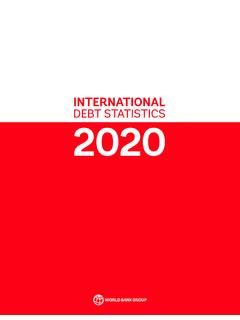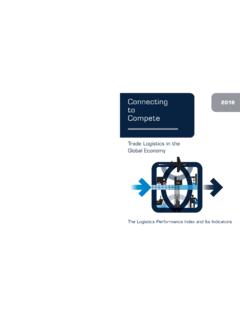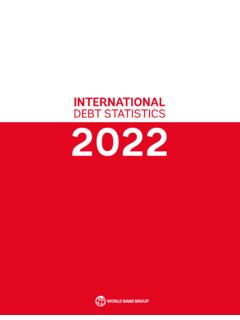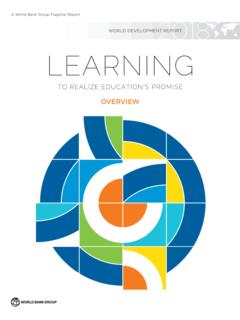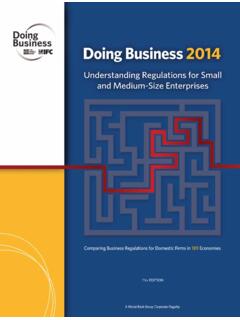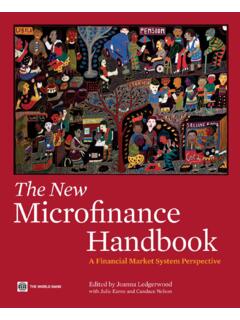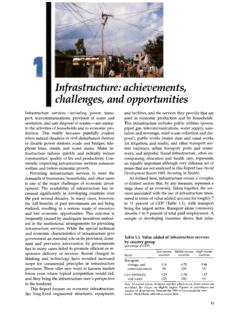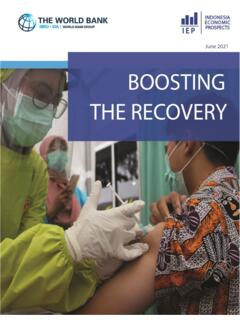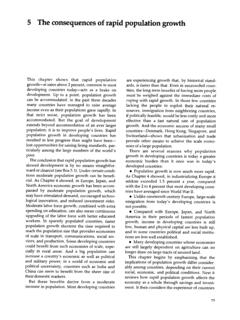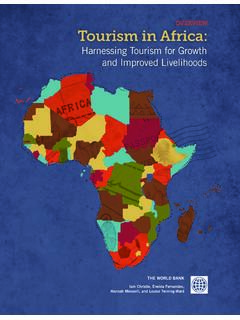Transcription of Doing Business 2020 - World Bank
1 Doing Business 2020. Comparing Business Regulation in 190 Economies Doing Business 2020. Comparing Business Regulation in 190 Economies 2020 International bank for Reconstruction and Development / The World bank 1818 H Street NW, Washington, DC 20433. Telephone: 202-473-1000; Internet: Some rights reserved 1 2 3 4 22 21 20 19. This work is a product of the staff of The World bank with external contributions. The findings, interpretations, and conclusions expressed in this work do not necessarily reflect the views of The World bank , its Board of Executive Directors, or the governments they represent. The World bank does not guarantee the accuracy of the data included in this work. The boundaries, colors, denominations, and other information shown on any map in this work do not imply any judgment on the part of The World bank concerning the legal status of any territory or the endorsement or acceptance of such boundaries.
2 Nothing herein shall constitute or be considered to be a limitation upon or waiver of the privileges and immunities of The World bank , all of which are specifically reserved. Rights and Permissions This work is available under the Creative Commons Attribution IGO license (CC BY IGO). Under the Creative Commons Attribution license, you are free to copy, distribute, transmit, and adapt this work, including for commercial purposes, under the following conditions: Attribution Please cite the work as follows: World bank . 2020. Doing Business 2020. Washington, DC: World bank . License: Creative Commons Attribution CC. BY IGO. Translations If you create a translation of this work, please add the following disclaimer along with the attribution: This translation was not created by The World bank and should not be considered an official World bank translation.
3 The World bank shall not be liable for any content or error in this translation. Adaptations If you create an adaptation of this work, please add the following disclaimer along with the attribution: This is an adaptation of an original work by The World bank . Views and opinions expressed in the adaptation are the sole responsibility of the author or authors of the adaptation and are not endorsed by The World bank . Third-party content The World bank does not necessarily own each component of the content contained within the work. The World bank therefore does not warrant that the use of any third- party-owned individual component or part contained in the work will not infringe on the rights of those third parties. The risk of claims resulting from such infringement rests solely with you. If you wish to re-use a component of the work, it is your responsibility to determine whether permission is needed for that re-use and to obtain permission from the copyright owner.
4 Examples of components can include, but are not limited to, tables, figures, or images. All queries on rights and licenses should be addressed to World bank Publications, The World bank Group, 1818 H Street NW, Washington, DC 20433, USA; e-mail: ISBN (paper): 978-1-4648-1440-2. ISBN (electronic): 978-1-4648-1441-9. DOI: Cover design: Bill Pragluski, Critical Stages Library of Congress Control Number: 2019951789. Resources on the Doing Business website Current features Historical data News on the Doing Business project Customized data sets since DB2004. Rankings Law library How economies rank from 1 to 190 Online collection of Business laws and regulations relating to Business Data All the data for 190 economies topic Contributors rankings, indicator values, lists of More than 15,000 specialists in regulatory procedures and details 190 economies who participate in underlying indicators Doing Business .
5 / Doing - Business Studies Access to previous editions of Doing Entrepreneurship data Business as well as subnational and Data on new Business density (number regional studies, case studies and of newly registered companies per 1,000. customized economy and regional profiles working-age people) for 156 economies . /exploretopics/entrepreneurship Methodology The methodologies and research papers Ease of Doing Business score underlying Doing Business Data benchmarking 190 economies to the best regulatory practice and an ease of Doing Business score calculator Research . Abstracts of papers on Doing Business / Doing - Business -score topics and related policy issues Doing Business reforms Short summaries of DB2020 Business regulation reforms and lists of reforms since DB2006. iii Contents vii Foreword oing Business 2020 is the 17th in a D.
6 Series of annual studies investigating ix Acknowledgments the regulations that enhance Business activity and those that 1 Overview Tackling burdensome regulation constrain it. Doing Business presents quantitative indicators on Business 17 Chapter 1 About Doing Business regulations and the protection of property rights that can be 29 Chapter 2 The effects of Business regulation compared across 190 economies . from Afghanistan to Zimbabwe and over time. 41 Chapter 3 Removing obstacles to entrepreneurship egulations affecting 12 areas of R. 57 Chapter 4 Employing workers the life of a Business are covered: starting a Business , dealing with 67 Chapter 5 Contracting with the government construction permits, getting electricity, registering property, 77 Chapter 6 Ease of Doing Business score and ease of Doing Business ranking getting credit, protecting minority investors, paying taxes, trading across borders, enforcing contracts, 87 Chapter 7 Summaries of Doing Business reforms in 2018/19.
7 Resolving insolvency, employing workers, and contracting with the 129 Chapter 8 References government. The employing workers and contracting with the government indicator sets are not included in this year's ranking on the ease of Doing Business . ata in Doing Business 2020 are D. current as of May 1, 2019. The indicators are used to analyze economic outcomes and identify what reforms of Business regulation have worked, where and why. v Foreword The Doing Business 2020 study shows that developing economies are catching up with developed economies in ease of Doing Business . Still, the gap remains wide. An entrepreneur in a low-income economy typ- ically spends around 50 percent of the country's per-capita income to launch a company, compared with just percent for an entrepreneur in a high- . income economy.
8 It takes nearly six times as long on average to start a Business in the economies ranked in the bottom 50 as in the top 20. There's ample room for developing economies to catch up with developed countries on most of the Doing Business indicators. Performance in the area of legal rights, for example, remains weakest among low- and middle-income economies. Doing Business recognizes the important work countries have done to improve their regulatory environments. Among the 10 economies that advanced the most, efforts were focused on the areas of starting a Business , dealing with con- struction permits, and trading across borders. In general, economies that score the highest share several features, including the widespread use of electronic systems and online platforms to comply with regulatory requirements.
9 At the same time, the least reformed area was resolving insolvency. Putting in place reorganization procedures reduces the failure rates of small and medium-size enterprises and prevents the liquidation of insolvent but viable businesses. Doing Business is a valuable tool that governments can use to design sound regulatory policies. By giving policymakers a way to benchmark progress, it stimulates policy debate, both by exposing potential challenges and by identi- fying good practices and lessons learned. It's important to note that Doing Business isn't meant to be an investment guide, but rather a measurement of ease of Doing Business . Potential investors consider many other factors, such as the overall quality of an economy's Business environ- ment and its national competitiveness, macroeconomic stability, development of the financial system, market size, rule of law, and the quality of the labor force.
10 Ease of Doing Business is an important springboard to structural reforms that encourage broad-based growth. The World bank Group stands ready to help countries move forward. David R. Malpass President The World bank Group vii Acknowledgments Data collection and analysis for Doing Business 2020 were conducted by a team led by Santiago Croci (Program Manager, Doing Business ) under the general direction of Rita Ramalho (Senior Manager, Global Indicators Group, Development Economics). Overall guidance for the preparation of the study was provided by Simeon Djankov (Senior Director, Development Economics). The project was managed with the support of Adrian Gonzalez, Charlotte Nan Jiang, Valentina Saltane, and Hulya Ulku. Other team members included Marwa Abdou, Youmna Al Hourani, Lucia Arnal Rodriguez, Yuriy Valentinovich Avramov, Ogma Dessirama Bale, Elodie Bataille, Farihane Ben Yedder, Erica Bosio, Liliya F Bulgakova, Kamal Chakaroun, dgar Ch vez, Maria-Magdalena Chiquier, Cyriane Marie Coste, Sabrina Fantoni Custodio, Najah Nina Dannaoui, Theophile de Saint Sernin, Marie Lily Delion, Nadine DiMonte, Varun Eknath, Viktoriya Ereshchenko, Vanessa Maria Cervello Ferrando, Dorina Peteva Georgieva, Claudia Gonzalez Cobos, Tom Kairuz Harb, Becem Hassen, Maho Hatayama, Maksym Iavorskyi, Amina Naomi Idris, Herv Kaddoura, New Doe Kaledzi, Klaus Koch-Saldarriaga, Olga Kuzmina, Sarah Kouhlani Nolla, Iryna Lagodna, Loic Sebastien Lanci, Anouk Leger, Joseph Lemoine, Tiziana Londero, Silvia Carolina Lopez Rocha.
